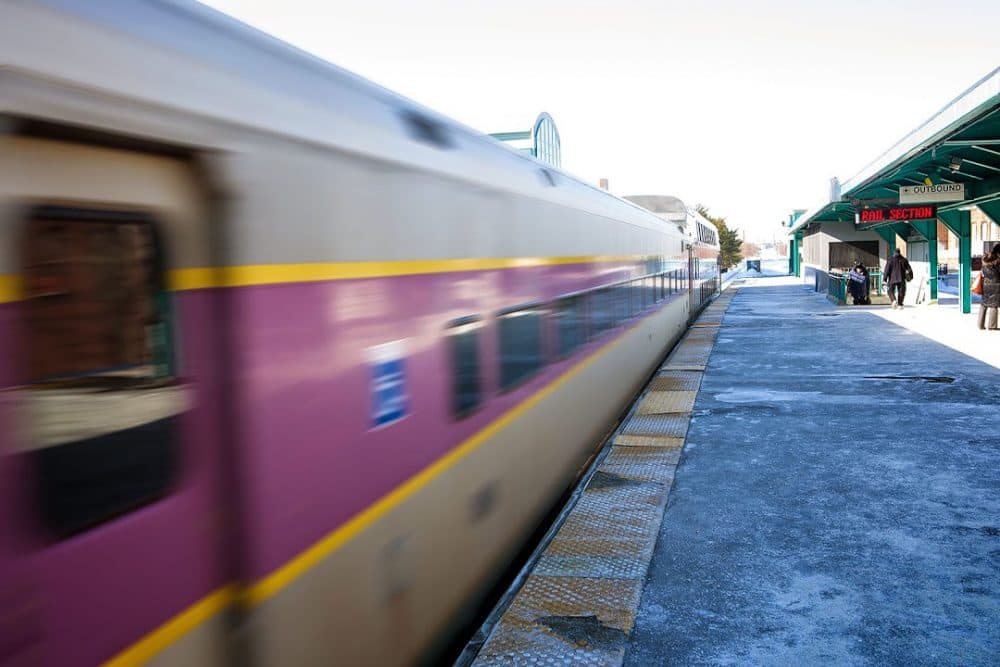Advertisement
Is It 5 Percent Over 24 Months, Or 10 Percent? Dispute Emerges Over Cap On MBTA Fare Hikes

As members of the MBTA's new control board weigh possible fare hikes for next summer, just how much they're allowed to raise fares is coming into question.
Public transportation advocates speaking during Monday's board meeting said that in drafting the 2013 transportation finance law, legislators intended to cap fare increases at 5 percent every two years.
But Transportation Secretary Stephanie Pollack, speaking to reporters after the meeting, said the way the law is written makes it clear the limit is 10 percent.
"The statute says what the statute says," Pollack said. "There will be a lengthy public process around fare policy and around the level of any fare change, and if the Legislature feels like they meant one thing and said another, they of course always have the opportunity to make changes."
The line in question from the final version of the 2013 law reads:
The authority shall not increase fares at intervals of less than 24 months or at an annual rate greater than 5 per cent.
"Those two things are not inconsistent," Pollack said. "You can increase [fares] only every two years and not more than 5 percent annually if at the two-year mark you increase it up to 10 percent."
Charlie Ticotsky, the policy director at Transportation for Massachusetts, said after the control board meeting that the word "annual" was added, perhaps in error, as representatives from the House and the Senate worked to reconcile their two bills in conference committee.
"The previous leadership of MassDOT and the MBTA interpreted it as 5 percent," Ticotsky told reporters.
In a later email, Ticotsky said that the amendment proposing the fare cap that was adopted in the Senate did not include the word "annual." He also pointed to another section of the final version of law, which mentions limiting fare increases "to not more than 5 per cent every 24 months."
The last T fare hike in 2014, and the first after the law was passed, was 5 percent.
Rafael Mares, with the Conservation Law Foundation, spoke out at Monday's meeting against raising fares more than 5 percent.
"If you do try to increase it more than 5 percent, which is what people are expecting at this point, I predict you will be hearing from people," Mares said. "From high school students who will tell you that they have to miss class, from seniors who can’t make it to church, and from patients who have to miss medical appointments."
Lee Matsueda, from Alternatives for Community and Environment, went further, calling on the T to hold fares where they are.
"Riders believe they are paying their fair share," he told the board.
Secretary Pollack said the board "has a long way to go" before making any decisions around fares, and she noted that a 5 percent increase is the "working number" the T is using to plan its budget for next year.
"We want the service to be affordable, but we also want to provide a good service and to provide a good service we need to invest in the system," Pollack said.
Also at Monday’s meeting, the T’s control board approved a $338.5 million contract for the installation of positive train control — a technology meant to prevent train accidents — on all commuter rail lines. The entire cost of the project, including a $58.8 million contingency and other expenses outside the scope of the contract, is estimated at $451.3 million.
The technology is mandated by the federal government, and the deadline to have it installed was recently pushed back from December 2015 to December 2018. Still, the T predicts it will not able to complete the project until 2020. And Pollack said that timeline would require the occasional suspension of weekend service on some commuter rail lines.
The T is also still trying to figure out how to pay for the project. The contract approved on Monday does not require any payments from the T through June 2017. By then, the T hopes it will have federal loans in place to help finance the project.
This article was originally published on November 03, 2015.
